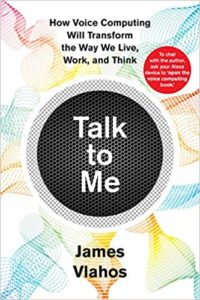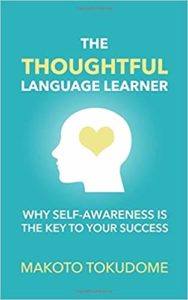Podcast: Download (Duration: 42:32 — 34.8MB)
Subscribe: Spotify | TuneIn | RSS | More
What if the future of book discovery and purchasing is mobile-first through apps like WeChat which dominates in China? I talk about AI translation, voice-first tech and more with Makoto Tokudome today.

In marketing news, Google announces at their I/O conference that they will add podcasts to search results and a new podcast app to Android devices. Have you included podcasting as part of your marketing strategy? Do you have audiobooks on Google Play? [Marketing Profs]. Plus, I talk about my experience of Oxford: Decadence, Discipline, and Dreaming Spires on my Books and Travel Podcast.


- How Chinese readers find and buy books at the moment, including Douban social network
The dominance of WeChat and mobile payments
- How to self publish in China on DangDang through PublishDrive. [My books are slowing getting there! DangDang]
- Using Amazon Polly (AI text to speech) to turn your book into an audio podcast
- Voice assistants and voice search, as discussed in Talk to Me by James Vlahos.
- The potential of AI translation and why Makoto thinks he will be out of a language teaching job in a few years (but why cultural translation will always be needed).
- NaNoGenMo: Spend November writing code to generate a novel of 50K or more (in parallel with NaNoWriMo).
- GPT2 Text Generator tool. You can play with it at www.TalkToTransformer.com.
- Getting excited about how we can use AI to enhance our creativity
You can find Makoto at www.mtokudome.com
Transcript of interview with Makoto Tokudome
[Joanna] Makoto Tokudome is an author, language teacher, and coach based in China with an interest in A.I. and voice technologies for authors. His most recent book is The Thoughtful Language Learner. Welcome, Makoto.
[Makoto] Hi Joanna. Great to be here.
[Joanna] Oh it's great to have you on the show. First of all, tell us a bit more about you and your background across the US and China.
[Makoto] Sure. So you could probably guess from my name that I'm Japanese American. So I was born and raised in the U.S. I guess I would call L.A. or Los Angeles my hometown and my background. I'm happily married for the last twelve years and my wife and I have two kids and we currently live here in China. I work here in China as an English teacher at a local university. My wife is Chinese American.
[Joanna] And were your kids born in China or are they American too?
[Makoto] They are a blend. So part of our dream or our goal for them was they could have this cross-cultural experience living overseas and learn a little bit about Chinese culture, Chinese history. I think one of the greatest benefits is they get to learn Chinese as well and become bilingual.
[Joanna] I'm super jealous of your children! I don't have another language and I think what you're doing is fantastic. So let's get into China and I and everything that you and I are interested in.
How do Chinese readers find and buy books right now? What is the current state of how we might reach them when writing in English?
[Makoto] Before this chat I was actually looking online, doing a little bit of background research. A lot of people know already that China has such a huge population. It's now over 1.3 billion people, 830 million people that are online regularly and many of those people are shopping online, buying things online, including books. The book market is the largest in the world maybe surpassing the US, 50 plus billion dollars or something. So I think there's definitely scope for authors thinking about the China market. There's definitely huge potential but I think maybe there are also some challenges as well.
[Joanna] Absolutely. One of the things that I noticed when I went back to New Zealand last time is that people can now pay by WeChat or AliPay. That's not something that we see a lot in the UK.
So what's happening with apps for payments and how does that work with the book ecosystem?
[Makoto] Yes. Apps are a huge thing here in China. Just like many other countries. But maybe what's unique about China is there are some very large companies such as you mentioned WeChat which is owned by the company Tencent.
Honestly, there is no parallel even in the US or in Silicon Valley. People say it's a combination of a messaging app but also mobile payments. It's a bit like Facebook and some people even do online reading on it as well.
What's remarkable I think is there's just so many people that use it on a day to day basis whether you're buying groceries or ordering an Uber. So the WeChat model or the reach a company can have with all this data across your shopping habits, as well as maybe for readers about what kind of books they like to read. For people thinking about entering the market, there's potential for understanding where are the niche niches for your type of book, or what type of audience you're trying to reach.
[Joanna] I feel like I need to get on WeChat. I know we can here in the UK. It's just because it's not really used. I definitely want to come out to China and I don't think you can come without having that payment method.
[Makoto] I mean you can use cash, you can still use cash, but these days the majority of payments just happen. You know you scan a QR code, you pay with your phone, from young teenagers all the way to the grandmas and grandpas are all using it.
[Joanna] Which is incredible because that to me that makes digital so much more seamless than we have. I mean Amazon has seamless one-click payments but that's about the closest and the payment still goes separately.
How do people find books? For example, I might put a tweet out here in the UK and someone might see that in the UK and buy a book.
What are some of the ways that people are finding books in China?
[Makoto] There are different ways that people might find books. It could just be through social media app like WeChat. Like I mentioned, there's a messaging app but it could also be like Facebook where people are their friends, your community. They're sharing different posts and then maybe that includes books that they've been reading.
From right there they can see what people are reading and even purchase the ebook through the WeChat program.
Another I think a big one that even a lot of my students use is called Douban.com and basically, that's an app just like Goodreads. Well, it's kind of a Goodreads on steroids. It's a social network for books. It also includes music and movies and so many people go there just to see what's trending. What are the most popular books these days. You can drill down on all sorts of categories whatever you're interested in reading.
[Joanna] Fantastic. In terms of the digital bookstores that we might know, I think the Kindle China store is still open although they pulled out in a lot of ways.
But are there any ways that we can actually reach Chinese readers right now?
[Makoto] From what I understand the only way for those from overseas who want to get into the China market for self-publishing is to use PublishDrive. My understanding is they work together with a retailer called DangDang.
[You can see some of my books on DangDang here.]
But it's China. My understanding it's divided into two worlds or two spheres. So the first one if you want to publish books in China all these publishing companies go through the state. So there is a censorship process that all these books go through before you can obtain its ISBN.
That's one sphere. The other sphere that really has been popular in the last couple of years is people who consume either short books or serialized fiction online. There's a lot of different apps that are also doing this. I guess it's kind of akin to Wattpad.com. There are so many authors and so many readers. Some of them eventually become a professionally published author because they become so popular.
[Joanna] Fantastic. So what about audio.
Are people listening to digital audiobooks on apps as well?
[Makoto] Yes, audio I think is another one that's really growing. It's not only audio books but the consumption of podcasts or consumption of audio lectures. There's also these online audio apps or sites that people are using to listen to. I think many of them are very similar to podcasts like we have in the US or in the West but a lot of them are also paid for content. So people are using it to learn how to maybe improve their IQ or learn how to become a better manager. And so in some of those areas, e-books or books are also being turned into audio content as well.
[Joanna] Now we connected because you did a blog post on TheCreativePenn about using Amazon Polly for audiobook creation. You also recommended Talk to Me by James Vlahos which I've listened to now and it's amazing.
So, how can authors use voice tech for creation or publishing and ebook marketing?
[Makoto] That guest post is really like a proof of concept. It's basically taking your creative work, your written text, and using this text to speech technology that Amazon has. You're paying not that much money to convert it into voice.
Actually, I use the British voice and so I took all the text of my book and converted it into voice recordings for each chapter. A lot of people maybe tried something like that a couple of years ago and they feel it's very robotic. It's hard to understand. Actually, it's quite amazing just how far technology has come. I wouldn't say you can fool someone to think it's human narration but I think I could definitely listen at length to these different recordings.
And so for authors, you know some people are actually getting into recording their own books for audio books but I would guess including myself maybe I don't have the background or maybe I don't have the time. You can use these technologies. I think in the future to create your written work into audio work.

So how do you think this voice-first and voice search technology is going to change the way that books are found and consumed?
[Makoto] Yes. So a lot of people I think these days throw this phrase around: voice first. I think that's going to become more and more important, not just for authors, but I think it's something that authors and creatives should also be paying attention to.
James Vlahos in his book, Talk to Me, gives the history or the background of how far voice technology has come. And then he slowly starts to paint a picture of what it's going to be like in the future. That is, the way we interact with devices and technology. Maybe it won't be that we're standing or sitting in front of a computer screen typing Google searches, but that more and more the way we search for stuff, the way we interact with our computers, will be more driven by voice.
And so I think that authors and creatives need to maybe start thinking about, well, if that's the case, then how can I make my creative work, my author platform, and all those things easier to be found through either voice assistants like Alexa or Siri.
This is a huge area that Amazon is spending and investing a lot of money in. Maybe authors can explore or think about how they can slowly put their presence onto this area as well.
[Joanna] I'm currently writing a 10-year business plan around voice-first. It is a fascinating area and I feel like I'm on day one of learning about it. So thank you for recommending that book to me.
Now I want to ask you because you're a language teacher and you help people learn languages. But one of the fascinating things is A.I. language translation.
At the Beijing Book Fair last year (2018) they translated a book from English into Mandarin in a couple of seconds [The New Publishing Standard].
Translation has incredible potential with AI. But what do you think as someone who makes his living this way?
[Makoto] It's funny because I'm a language teacher but then at the same time I'm an enthusiast. I geek out and like to learn or read about the technology that's coming.
I actually realized that maybe my job as a language teacher could become replaced or obsolete maybe in the next five to 10 years.
I think there will still be a place for language teachers or cultural teachers but a lot of this A.I. translation, whether it's translation or interpretation, it's getting better and better and better. Some jobs maybe will be replaced by technology.
One of the interesting things I was looking at the other day as regards to authors is whether machines can create fiction from scratch. In parallel to NaNoWriMo, they have NaNoGenMo where they can see if they can create generate fiction from scratch. It's many years down the road to have something interesting to read, but just to know that people are working on something like this is maybe something to pay attention to.
[Joanna] I've been playing with the GPT2 Text Generator tool which is kind of crazy. You can play with it at www.TalkToTransformer.com.
You've said five to ten years with AI translation. But things speed up, don't they. There's already language translation where you can do Skype calls where it translates as people speak.
What are the other things that we both geek out over?
The book, AI Super Powers by Kai-Fu Lee. In the UK, it just wasn't being stocked in bookstores. It's not being talked about really. I couldn't even buy a copy for a friend of mine. I was like “Where is this book?” This should be everywhere. I think it's because of the negative press around China and technology most likely.
What are some of the things that you're particularly excited about in terms of AI and how that might impact authors and writers?
[Makoto] Big question. AI Super Powers, I also thought is a fantastic book. Anyone interested in just understanding in the last five or 10 years what's been happening technology-wise in China. I think it's a great read and especially in the area of A.I. and how jobs will change as this technology continues to progress. Like I mentioned about my own job as a language teacher, and what are the other types of jobs or industries that might be at risk.
For authors or creatives, I think this is where maybe we can be a little bit encouraged. He has this I guess this pie graph or this x y axis talking about what are the jobs that will be most secure and what are the jobs that maybe are at risk being replaced by AI.
He talks about the ones that are most probably the safest or most secure are the ones that depend highly on creativity, so creatives and artists I think can be safe from these AI technologies.
Instead of seeing AI as something that you're trying to run away from, more and more I think we can think about how we can use it to compliment our creativity.
So I think already in areas like music or painting people are using A.I. to teach them. Maybe in music they're mixing jazz and classical music and they create these brand new compositions and music that gives them maybe new ideas or inspirations.
And I feel that even with this NaNoGenMo, maybe you'll never produce a bestselling book but it can be used to generate creativity and it's something that we should look forward to versus maybe be afraid of.
[Joanna] Oh yeah, I see technology more as a leverage point or a way to supercharge what we already have. So you know, without the internet I wouldn't have a business, we wouldn't be having this conversation.
There are lots of creative ideas. So instead of me writing a book on say ‘how to write a novel,' why don't I write an Alexa Skill instead. That's really an interesting idea.
[Makoto] One of the cool things I was checking out earlier this year, Alexa came out with a new skill Choose Your Own Adventure stories [TechCrunch].
I remember reading these as a young boy. I love those books. If you choose to go down this mountain, turn to page 76 or something. Now it's turned into audio form and so far I think they have maybe five or six different stories which take you to dozens of different alternative endings. And I think that's so cool that fiction writers can use technology like that.
We're just on the beginning stages of exploring voice technology together with fiction writing and maybe something especially for fiction writers to pay attention to if you can be early into this kind of market you can really do well for yourself.
[Joanna] It feels like 2009 for e-books. Like people keep saying, Why can't we have all this stuff for audio books like we do for e-books? (marketing, categorization etc). And I'm like well that's because we're still at the beginning.
I mean the audiobook stuff in the last 18 months has really taken off but things are changing. A very exciting time. Tell people where can they find you and your book online.
[Makoto] My book is called The Thoughtful Language Learner and you know Joanna I just want to say I've been listening to your podcast for a long time. I've been a big fan and many of your episodes have been instrumental or helpful and just this self-publishing process so.
I appreciate all the content you make. So my book is available on Amazon both Kindle and paperback. And if people want to connect with me they can find me on my Web site, www.mtokudome.com
[Joanna] Fantastic and I'll put all the links in the show. Thank you so much. That was brilliant.



Great interview! Thanks, Joanna, I will share this widely as always.
Very informative episode! I have been thinking of publishing in the Chinese market, and thanks to you and your guest, I now have some resources and a pathway to do just that. Thank you!
Brilliant podcast Joanna and Makoto, thank you. After listening I always have an extra to-do list, Joanna, it’s like you’re my boss!!! (A super enthusiastic one obvs)
As usual, I ended up taking about 20 notes of things to research and read. Wonderful interview with Makoto Tokudome, full of information and intriguing visions of the future. Especially valuable as a starting point for anyone wanting to sell their books in China.
Thanks for your awesome interview and the previous solo episode on AI. You mentioned about changing/updating our author websites to be audio friendly or voice first – I would love to have practical steps or ideas on what we should be looking at with updating our websites to voice first – do you have an article on that or are you able to do an article on that? Thanks heaps!
Glad you found it interesting, Rachel. You’ll find more here: https://www.thecreativepenn.com/2019/05/13/voice-search-for-authors/
Hi Joanna,
I have been going through your podcasts and have been enjoying (and learning a lot from) them. However, I have to say, as someone who does editing work for Chinese writers, it’s misleading for Mr. Tokudome to imply that WeChat is the right place to start for writers looking to enter the Chinese market.
Webnovels drive the Chinese popular book market. Webnovel platforms like jjwxc.net have a huge subscriber base, and some writers have become celebrities with devoted followings, and their stories have been adapted for film or TV. This link may help provide more information, although it mostly focuses on webnovel platforms targeted at non-Chinese readers:
https://pandayoo.com/2020/11/17/in-the-past-year-more-than-3000-chinese-web-novels-have-been-published-with-overseas-readers/
Anyone who wants to break into the Chinese webnovel market should take a good look at webnovel platforms and see if they can get partnerships for their translated work.
Mr. Tokudome also neglects to mention that Douban actually sells books on their site, and for authors who don’t want to work with webnovel platforms, it’s absolutely worth the while to try to get in Douban’s bookstore. At the moment, I see that the popular foreign books are a Rick and Morty art book, Angela Carter’s Wise Children, and a Paul Halter collected works.
WeChat and Weibo–a social media platform I’m very surprised wasn’t mentioned–are better suited for marketing and keeping in touch with readers, especially since Chinese readers aren’t fond of going to individual author sites and will likely not sign up for newsletters. Although you can certainly link a WeChat account to ecommerce, Chinese readers are more likely to buy books online from Douban or have a subscription to a webnovel platform.
The main issue when it comes to working with state publishers is that they prefer non-fiction (business, philosophy, science, self-help are their preferences) and tend to skew towards big author names. There are small presses but they usually focus on a very specific niche, such as Buddhist teachings, and so on.
Apologies for the long comment, but I wanted to clear up the misconceptions.